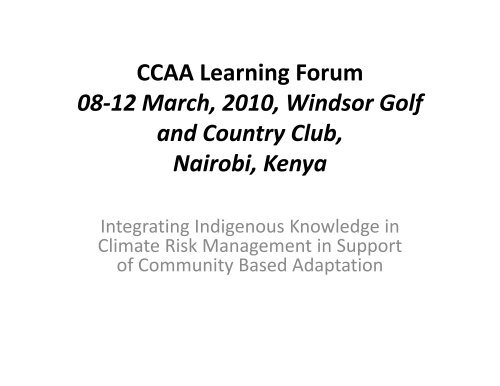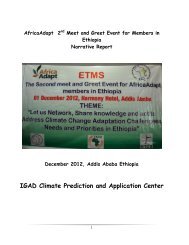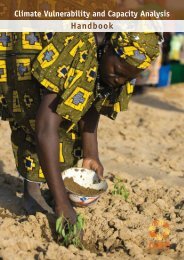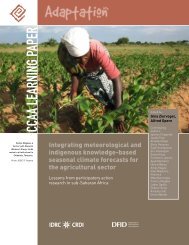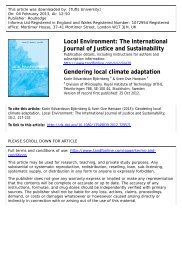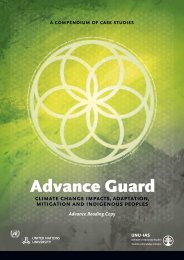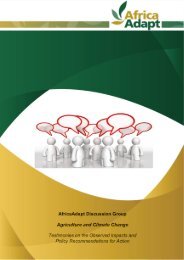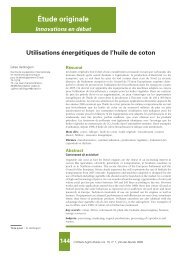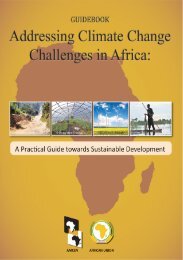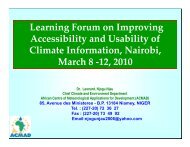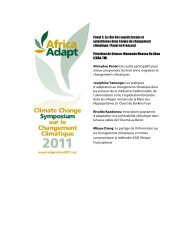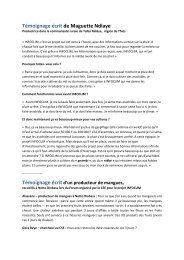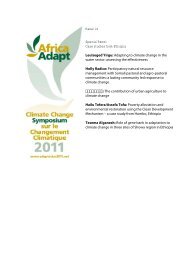Background Presentation: Kenya - ICPAC - Africa Adapt
Background Presentation: Kenya - ICPAC - Africa Adapt
Background Presentation: Kenya - ICPAC - Africa Adapt
You also want an ePaper? Increase the reach of your titles
YUMPU automatically turns print PDFs into web optimized ePapers that Google loves.
CCAA Learning Forum08‐12 March, 2010, Windsor Golfand Country Club,Nairobi, <strong>Kenya</strong>Integrating Indigenous Knowledge inClimate Risk Management in Supportof Community Based <strong>Adapt</strong>ation
• Climate is closely linkedto sustainability ofcommunity livelihoodsand lives• Extreme climatevariabilities such asfloods and droughtsoften have far reachingenvironmental, healthand socio‐economicimpacts in manydeveloping countries<strong>Background</strong>
4Zone 1 MASSAWA0.520*SST1-0.52*SST23•There are tools for2monitoring climate10•The Modern‐day-1climate scientists-2can now be able to-3provide forecasts-4sometimes with leadtimes of over threemonths•However, therehave beencomplaints from theusers, particularly oninterpretation of theproductsSTDANOMALY196119631965196719691971197319751977197919811983YEARS1985198719891991199319951997199920012003ObsPredLTUT
•IK have developedtechniques andstrategies forforecasting, andmanaging gclimatevariability•This forecastingdepends onobservation of thenaturalenvironmentincluding:FloraFaunaStars
The Project• However, there is still a gap in reducingvulnerability in communities despiteavailability of good modern‐day day science and IKforecasts• There is a realization that merging the twosources of information may lead to betterclimate risk management and hence promotepoverty reduction and sustainable development
The Specific Objectives• Demystify Nganyi community IK and developsustainable framework for integrating IK andwestern climate risk science• Gender Analysis –roles of men and women inaccess, control and management of naturalresources including climate risk management
• Develop and improve the packaging andcommunication of IK integrated seasonalclimate forecasts.• Investigate the potential impacts of futureclimate changes on the IK systems• Develop curriculum that can be used toIntegrate IK and western science disaster risk ikreduction
Project Team• Due to the multidisciplinary nature of climatechange, the project team is alsomultidisciplinary– NGANYI core group and community– <strong>ICPAC</strong>– KMD– KIPI– NMK (Kisumu)– GLUK
• Property rights ‐ KIPIDemystification• The TWO knowledge bases sharing information– Indigenous– Botany– Zoology– Cosmology• Papers and a book on Nganyi history
Integrated forecasts
Interpretation of Forecasts• Incorporating govtofficers fromdifferent sectors, wewere able to deliverthe message inpractical, usableterms – not so muchmeteorologicalterms!
Dissemination• The advisories arrivedat during the integratedforecasts weretranslated into the local(Luhya) language• Brochures• Radio interviews• Community meetings
Other Activities• Climate scenarios developed for 2030, 2050 &2080 using Precis• The development of integrated DisasterManagement curriculum– Draft modern‐dayd– Draft IK curriculum– Integrated– To be presented to GLUK senate for approval
Challenges• <strong>Adapt</strong>ation is strongly linked to development– Project was purely for information provision– Acting on the information depends on thecapacity of the community• Poverty is a major problem• Even with the incorporation of the IndustrialProperty Institute as partners, release ofinformation is still restricted


